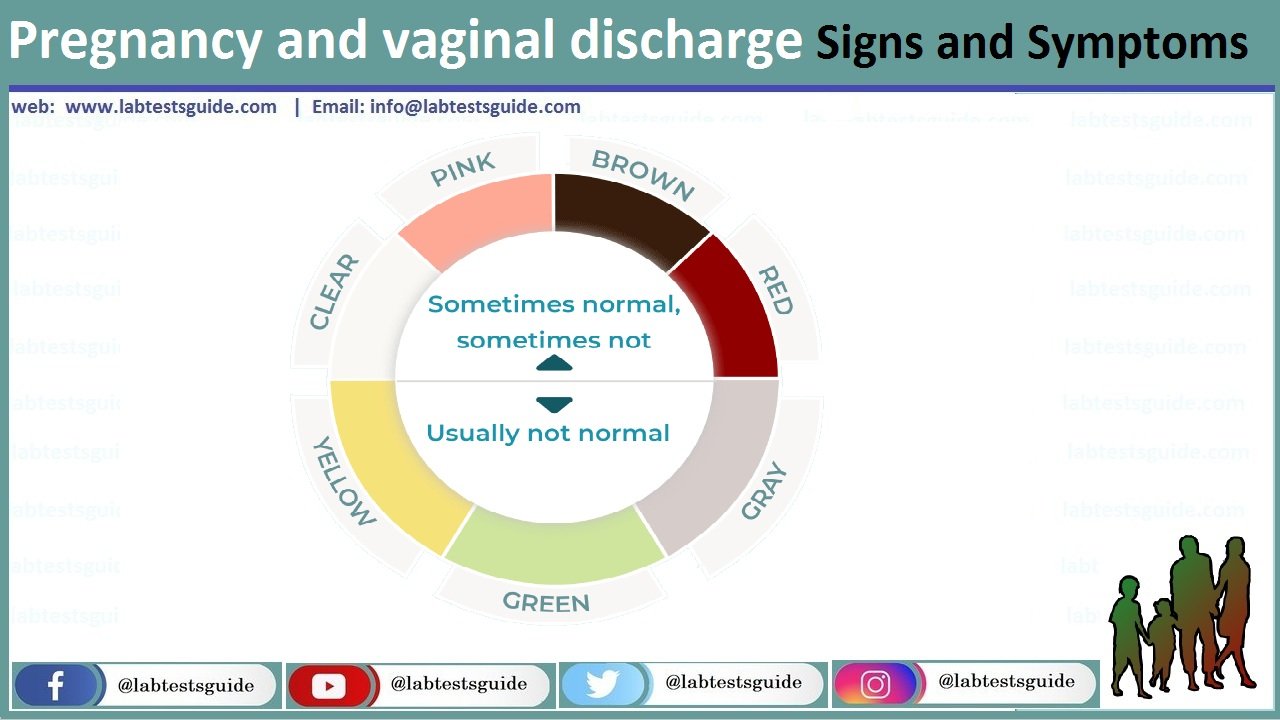Vaginal discharge is one of the first signs of pregnancy. Your output may increase within one to two weeks of pregnancy, even before your expiration.

As your pregnancy progresses, it will continue to increase in volume. The discharge is also thicker and more frequent. It is usually heavier at the end of your pregnancy.
During the last weeks of your pregnancy, you may have thickened mucus and blood lines in your vagina. It’s called the “bloody show.” It may be an early sign of wages. Let your doctor know if you have any bleeding.
The common vaginal discharge, or leucorrhea, is thin and clear or milky white. It also has a light smell.
If your discharge is yellow, green or brown, with a strong and unpleasant odor, this is considered unusual. Abnormal discharge can be a sign of infection or anxiety of your pregnancy, especially if there is redness, itching or swelling.
If you think you have abnormal vaginal discharge, tell your health care provider right away. Find out more about vaginal discharge during pregnancy.
Pregnancy tests
- An ultrasound will be used to confirm and date your pregnancy.
- Human chorionic gonadotropin (hCG
- Complete Blood Test
- Blood Glucose Test
- Urine C/E
- Blood group
- Anti HCV
- HbsAg
- HIV
Related Content :
- Pregnancy and vaginal discharge.
- Pregnancy and urinary tract infections (UTIs).
- Pregnancy prevention.
- Pregnancy diet.
- Pregnancy and exercise.
- Pregnancy massage.
- When to seek medical care.
- Pregnancy and labor.
- Prognosis.
- The takeaway.
Tests Associated with Pregnancy
| PURPOSE | TEST NAME | WHY PERFORMED | WHEN PERFORMED | WHO PERFORMED ON/SAMPLE |
|---|---|---|---|---|
| Genetic tests for inherited diseases | Genetic testing for inherited diseases | Check carrier status for certain genetic diseases to determine risk of having a baby with such a disease | Preconception or first trimester | Mother and father (blood sample) |
| Genetic testing for hemoglobin disorders | Check carrier status for certain abnormal hemoglobin disorders to determine risk of having a baby with such a disease | Preconception or during pregnancy | Mother and father (blood sample) | |
| Cystic fibrosis carrier testing | Check carrier status for CF | Preconception or first trimester | Mother and father (blood sample) | |
| Testing to detect health conditions in the mother | Blood glucose or hemoglobin A1c | To screen women at risk of type 2 diabetes (which is different than gestational diabetes) | Preconception or first trimester | Mother (blood sample) |
| Pap test and HPV testing | Screen for cervical cancer and some STDs | Preconception or first trimester | Mother (cells from her cervix) | |
| Immunity to rubella (German measles) | Check for immunity to the virus, which can cause birth defects | Preconception or first trimester | Mother (blood sample) | |
| HIV screening test | Check for HIV infection so steps can be taken to reduce likelihood of transmission to the baby | Preconception or first trimester; may be repeated in third trimester if at high risk | Mother (blood sample) | |
| Gonorrhea, chlamydia, and syphilis tests | Check for STD infections, which can cause miscarriage or infect the baby during delivery | Preconception or first trimester; may be repeated in third trimester if at high risk | Mother (cervical cells, urine or blood sample, depending on test) | |
| Hepatitis B and hepatitis C screening | Detect hepatitis B or hepatitis C infection | Pre-conception or first trimester; may be repeated in the third trimester if at high risk | Mother (blood sample) | |
| Varicella zoster virus testing | Check for immunity to chickenpox, which can cause birth defects | Preconception or first trimester | Mother (blood sample) | |
| TORCH panel | Check for infection with toxoplasmosis and other infections that can cause birth defects | Preconception or first trimester, if infections suspected | Mother (blood sample) | |
| Bacterial vaginosis | Detect infection, which can cause pre-term labor | Preconception or whenever symptoms experienced | Mother (vaginal secretions) | |
| Urine culture for bacteriuria | Detect bacterial infection in the urinary tract, which can lead to kidney infection or increased risk of pre-term delivery and low birth weight | First prenatal visit or between 12 and 16 weeks of pregnancy; may be repeated in third trimester | Mother (urine sample) | |
| Group B streptococcus | Detect infection, which can harm the baby during birth and infect the mother’s uterus, urinary tract, and any incision made during a cesarean section | Between weeks 35 and 37 of pregnancy | Mother (specimen from vaginal and rectal areas) | |
| Confirmation and monitoring of pregnancy and health of mother | Pregnancy test (hCG) | Confirm pregnancy | First trimester | Mother (blood sample) |
| Urine screen for glucose and/or protein | Check for signs of kidney or bladder infection, undiagnosed diabetes or gestational diabetes, or pre-eclampsia | Each prenatal visit | Mother (urine sample) | |
| Complete blood count (CBC) | Check for anemia and/or detect low platelet count | Preconception and/or early in the first trimester; repeated in third trimester | Mother (blood sample) | |
| Blood typing and antibody screen | Check for potential incompatibility in blood type between mother and fetus (such as Rh factor antibodies) | First trimester; antibody screen repeated between weeks 28 and 29 of pregnancy | Mother (blood sample) | |
| Glucose challenge test/oral glucose tolerance test | Check for gestational diabetes | Between 24 and 28 weeks of pregnancy | Mother (blood sample) | |
| Thyroid stimulating hormone (TSH) | In women with known thyroid conditions, to adjust medication if necessary | Throughout pregnancy | Mother (blood sample) | |
| Detection of fetal abnormalities or assessment of risk | First trimester Down syndrome screen | Assess risk of carrying a fetus with certain chromosomal abnormalities, such as Down syndrome | Usually between 11 and 14 weeks of pregnancy | Mother (blood sample plus ultrasound) |
| Second trimester maternal serum screen | Assess risk of carrying a fetus with certain chromosomal abnormalities or open neural tube defects | Between 15 and 20 weeks of pregnancy | Mother (blood sample) | |
| Cell-free fetal DNA | Assess risk of carrying a fetus with certain chromosomal abnormalities; currently recommended for women at high risk of having babies with these disorders | During or after the 10thweek of pregnancy | Mother (blood sample) | |
| Chorionic villus sampling | Detect chromosomal disorders in the fetus | Between weeks 10 and 12 of pregnancy, if recommended | Mother (cells from the placenta) | |
| Amniocentesis | Detect certain birth defects and chromosomal abnormalities | Between 15 and 20 weeks of pregnancy, if recommended | Mother (amniotic fluid) | |
| Cordocentesis | Detect chromosomal abnormalities, blood disorders, and certain infections | Between weeks 18 and 22 of pregnancy, if recommended | Mother/fetus (fetal blood sample obtained from vein in the umbilical cord) | |
| Fetal maturity/readiness for birth | Amniocentesis | Check fetal lung development | After week 32 of pregnancy if risk of pre-term delivery | Mother (amniotic fluid) |
| Fetal fibronectin (fFN) | Detect fFN; negative result is highly predictive that pre-term delivery will NOT occur in the next 7-14 days | Between week 22 and 35 of pregnancy, if having symptoms of pre-term labor | Mother (cervical or vaginal fluid sample) |
Related Articles:
RELATED POSTS
View all

